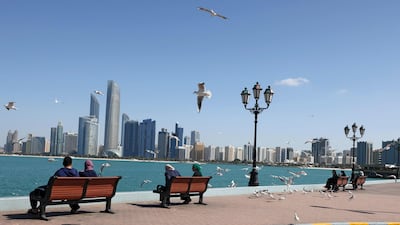Office rents in Dubai and Abu Dhabi are rebounding to pre-pandemic levels as demand for prime office space picks up amid a recovery in the UAE’s economy, according to a new report by Knight Frank.
In Dubai, office rents in five out of 27 locations have returned to pre-pandemic rates in the first quarter, while in Abu Dhabi, the city’s “best buildings continue to demonstrate rental resilience”, with average rents in the Corniche area climbing 7.2 per cent annually to Dh1,675 ($456) per square metre, the report said.
In Dubai, Business Bay led the recovery, with average rents in the first three months of 2022 surging 33 per cent to Dh101 per square foot compared to 2020.
“Despite the quieter end to 2021, early data from the first quarter suggests a rebound in demand in Dubai, led by technology businesses that are expanding their footprints, albeit many are start-ups,” Faisal Durrani, partner and head of Middle East research at Knight Frank, said.
“To an extent, the expansion by this group of occupiers is being eroded by a number of businesses that are still reassessing their occupational strategies, many of whom are shrinking their office footprints as a result of the rise in hybrid working models, which appear to be gaining a sense of permanency, particularly amongst international blue chip and professional services businesses, as well as a handful of international banks.”
The UAE, the Arab world’s second largest economy, has recovered from the impact of the pandemic on the back of surging oil prices and growth in its tourism and travel sectors as Covid-19 restrictions ease globally.
The country's non-oil economy expanded 7.8 per cent annually in the fourth quarter of 2021, as pandemic-related restrictions and travel curbs eased, the Central Bank of the UAE said in its Quarterly Economic Review.
Earlier this month, Sheikh Mohammed bin Rashid, Vice President and Ruler of Dubai, on Twitter said the country's economy grew 3.8 per cent in 2021 — well above the 2.1 per cent estimate by the World Bank. The growth exceeded the rate in 2019 and was the highest in the region, he said.
_________________________
Dubai property prices: where they are rising and falling - March 2022
_________________________
Many businesses have started asking employees to return to the workplace amid the economic recovery.
“There is a very limited supply pipeline of high-quality office stock in Dubai, which is where the attention of businesses remains centred,” Andrew Love, head of Middle East capital markets and occupier services and commercial agency at Knight Frank, said.
“The resultant impact of this market dichotomy is upward pressure on rents, or at worst, stability in lease rates for the city’s best buildings, while some of the older, more secondary stock is starting to experience a migration of businesses to better quality buildings.”
The shift towards remote working has also given further impetus to the serviced office sector, with providers offering enterprise solutions to businesses that are looking for greater lease flexibility and “plug and play” space, which is growing in popularity, according to Knight Frank.
“Overall, as the impact of the pandemic on Dubai’s economy abates, we are starting to see larger corporates requesting staff to attend the workplace more often,” Mr Durrani said.
“Smaller businesses, however, are likely to persevere with hybrid working models and indeed enterprise, or serviced office solutions for their space requirements.”





















